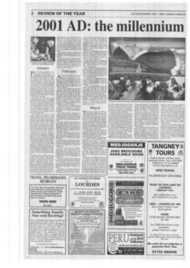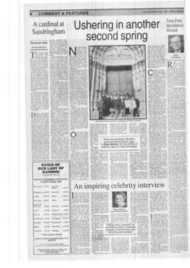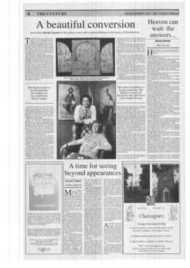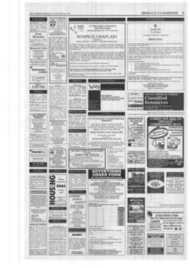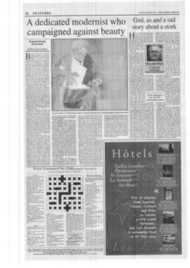Page 3, 28th December 2001
Page 3

Report an error
Noticed an error on this page?If you've noticed an error in this article please click here to report it.
Tags
Share
Related articles
Baroness Cumberledge To Lead Review Of Nolan Child...
Lives Remembered
Nolan Urges 'most Rigorous' Child Protection
Importance Of The Nolan Report
Nolan Moves Church Into Era Of Openness
The Catholic Herald
year in review Part 1
April
Ahigh-powered committee reviewing the Church's child protection procedures issued its long-awaited first report this month. The committee, chaired by Lord Nolan, made 50 recommendations which would make the Church's procedures among the most rigorous in Britain.
The Nolan Report, presented to the bishops of England and Wales for discussion at their Low Week meeting, said the welfare of children should be the primary consideration in any investigation of allegations of abuse.
The inquiry was initiated by Cardinal Murphy-O'Connor, who, while Bishop of Arundel and Brighton, made the mistake of permitting known paedophile Fr Michael Hill to work as a chaplain at Gatwick Airport, where he later re-offended.
Lord Nolan said: "Our proposals are meant to improve existing diocesan and national structures so that parishes are supported in their efforts to protect the children in their care. We also want to ensure a consistent and effective approach across the Church to child abuse."
The danger of false accusations in abuse cases was also highlighted this month, when a costly policeinvestigation at a top Catholic school was abandoned. The "painstaking" investigation at the London Oratory school found no evidence to substantiate allegations made against Fr David Martin, who died in 1998.
The priest. who was a chaplain at the school, was accused anonymously in letters sent last October to national newspapers and Church figures, including Cardinal Murphy-O'Connor.
A spokesman for the London Oratory said that fellow priests had never doubted Fr Martin's innocence.
He said: 'This should be an object lesson to people reporting these stories to treat them with great caution, because this wasn't done in some quarters."
April was also the month that the bishops of England and Wales finally broke their ties with a major Catholic publishing house. The bishops gave up their 81 per cent stake in Gabriel Communications — which publishes The Universe and The Catholic limes — following a management buy-out.
This month also saw a clutch of new appointments to vacant sees around England and Wales. Mgr Kevin McDonald, rector of Oscott College, Birmingham, was made the next Bishop of Northampton. Mgr George Stack, administrator of Westminster Cathedral, and Mgr Arthur Roche, general secretary of the Bishops' Conference of England and Wales, were chosen to serve as auxiliary bishops alongside Cardinal Murphy-O'Connor in the Westminster archdiocese.
We also discovered this month precisely how much it costs to become a saint. Experts in Italy calculated that it costs up to £7,000 to see a cause from the preliminary investigation to canonisation.
But Archbishop Edward Novak, secretary of the Congregation for the Causes of the Saints, said that costs depended on how widely-travelled the saint was.
"If you are talking about a nun who spent her life in the kitchen, the cause will cost almost nothing." he said.
A solidarity fund was created in 1983 to help the promoters of the causes of candidates from poorer countries meet the rising costs of canonisations.
May
Pape John Paul 11 astounded his critics when he completed an astonishing pilgrimage of the eastern Mediterranean "in the footsteps of St Paul". He began his trip in Greece, where he visited the Aeropagus of Athens, the place where the Acts of the Apostles says St Paul spoke about the "unknown" God in whom we "live, move and have our being". In Athens, the Pontiff took the surprise step of acknowledging such sins committed by Catholic Christians down the ages against their Orthodox brethren as the sack of Constantinople in 1204.
"For the occasions past and present, when the sons and daughters of the Catholic Church have sinned by actions or omission against their Orthodox brothers and sisters may the Lord grant us the forgiveness we beg of him," he said to applause from Archbishop Chistodoulos of Athens, who, under pressure from a rump of Orthodox clergy who objected to his visit, had earlier refused to meet him. The pair later embraced.
In Syria, John Paul made history when he became the first pope to visit a mosque. He made a pilgrimage to the Omayyad Mosque in Damascus, the reputed resting place of the head of St John the Baptist. Afterwards, the Pope travelled by car to El Quneitra, a war-ravaged ghost town in the Golan Heights, where he prayed openly for peace throughout the Middle East and the whole world. Throughout the trip, the Holy Father also called for greater dialogue and understanding between different faiths, and for justice and respect for human rights among peoples and governments, without naming any one in particular.
I-lis visit concluded with a two-day trip to Malta, where he was rapturously greeted by the island's predominantly Catholic population. The highlight of his visit was the beatification of two priests and a nun who lived in the 19th and 20th centuries,
Meanwhile, the Vatican's Congregation for Divine Worship and the Sacraments published the document, Liturgicam Authenticarn ("The Authentic Liturgy"), in which it demanded literal and faithful translations of liturgical texts from original Latin and reserved its right to veto trans lations it considered to be inadequate, therefore curtailing the powers of such bodies as ICEL (the International Commission on English in the Liturgy). LiturgiamAuthenticam also made a scathing attack on the use of "inclusive language" where genderspecific words such as "brothers" are replaced by words referring to either sex. Bishop Maurice Taylor of Galloway, chairman of ICEL, later said the new rules betrayed a lack of trust in bishops' conferences around the world. "There's a feeling among some bishops that they are just becoming branch managers carrying out the instructions of head office," he said.
Cardinal Murphy-O'Connor was keeping himself busy, naming 10 new canons as part of a major reorganisation of the Archdiocese of Westminster. Toward the end of the month, he visited Rome for the extraordinary consistory of cardinals where he made an appeal for an "ecumenical convention" of Christian churches.
May was the month when Mgr Kieron Conry, the former director of the Catholic Media Office, was named as the new Bishop of Arundel and Brighton; when Archbishop Nichols spoke out against proposals to decriminalise prostitution in Birmingham and when the ProLife Alliance was granted a judicial review of the Government's decision to allow abortifacient morning-after pills to be dispensed without a doctor's prescription.
It was also the month when the bishops of England and Wales unanimously approved the first report of Lord Nolan's review of child protection procedures in the Church. Cardinal Murphy-O'Connor said the bishops fully supported the so-called "paramountcy principle", which makes the "welfare" of children the over-riding concern, even if in the long term this could lead to possible injustices".
June
Tou's month saw the unexpected death f one of Britain's best-loved and most-feared clerics: Cardinal Thomas Winning. The cardinal collapsed and died from a heart attack on June 17, two years to the day after the death of Cardinal Basil Hume. It was Cardinal Winning's second heart attack in just nine days.
Pope John Paul II led tributes to the late Archbishop of Glasgow, describing him as a "zealous pastor", who fought tirelessly on behalf of the poor and defenceless.
He said: in recalling Cardinal Winning's generous and committed service as priest and bishop, I join in giving thanks to God for the many blessings bestowed on the Church through his ministry."
The Pope's words were echoed and amplified by religious and political leaders across Britain.
The Queen expressed sadness at the Cardinal's sudden death. Her Majesty said: "He made a very distinguished contribution tot he Catholic Church in Scotland and to Scottish public life over many years and he will be much missed."
Cardinal Murphy-O'Connor said he would miss an "outstanding leader", whose "humour, dedication, utter loyalty, and unstinting defence of the Catholic Church will be remembered".
Perhaps the most moving eulogy came from the head of Cardinal Winning's ProLife Initiative, Sr Roseann Reddy. The cardinal set up the pm-life initiative to help mothers in 1997. Upon his death, the initiative had helped at least 30 mothers who decided not to have an abortion, and provided support for 347 babies and their mothers.
'Women have been phoning us, saying he will never be forgotten and that they are sad that someone who believed in then has gone," said Sr Roseann. "He was neither a loveless nor a childless man. I feel proud to have known him."
Even in a weakened condition, the cardinal did not lose his sense of humour. After he was admitted to the Victoria Infimiary after his first heart attack, a nurse introduced herself to him, saying: "Hello, I'm Jane."
The cardinal replied: "Hello, I'm Tarzan."
June was also the month in which an English bishop was criticised for attending a Mass celebrating a 25-year relationship between two prominent Catholic homosexuals.
Bishop John Crowley of Middlesbrough was expected to celebrate the Mass, which took place on June 9, in a private chapel at Heythrop College, a Jesuit-run institute of the University of London. But after airport appeared in a national newspaper describing the event as a "gay thanksgiving" Mass, he decided to sit among the congregation instead. Bishop Crowley had been invited to celebrate the Mass to mark "25 years of friendship" between Julian Filochowski, the director of Cafod, and Martin Pendergast of the Roman Catholic Caucus of the Lesbian and Gay Christian Movement, At the start of the Mass at the Kensington-based college, the bishop stood up and explained to the congregation why he had decided not to be the chief celebrant. He said that in the light of some "highly misleading" press reports he wanted to make it clear "that what is being celebrated at this Mass is, as the invitation card indicated, '25 years of friendship and commitment to justice'. it is simply that".
The bishop then returned to his seat and the Mass was celebrated by Fr James O'Keefe, president of Ushaw College, Durham, the biggest seminary in England.
A spokesman for Bishop Crowley, who travelled to Holland shortly after the service, said the bishop would not have attended the Mass if he believed it was celebrating a homosexual partnership.
"Had he understood that they had a physical relationship, he would not have gone. He was very clear about that. He is not the least bit wobbly on the Church's teaching," he said.
This was also the month that Pope John Paul II made his difficult pastoral visit to Ukraine. 'The Pope brought a message of peace to the estranged Catholic and Orthodox Christians of the former Soviet republic.
Recalling his historic visit to Greece in May, where he asked for forgiveness for Catholic sins against the Orthodox, the Pontiff urged Ukraine's Christians to bow "before our one Lord" and recognise their faults.
He said: "The most fervent wish that rises from my heart is that the errors of times past will not be repeated in the future."
June also saw the first act of a tragicomic opera starring the controversial African Archbishop Emmanuel Milingo, who was removed from the archdiocese of Lusaka, Zambia, in 1983 because of concerns over his faith-healing activities. This time. he shocked the Catholic world by announcing that he had wed a Korean Moonie.
The archbishop, 71, was married by the Rev Sun Myung Moon to Maria Sung, a 43-year-old acupuncturist, in a group ceremony in a New York hotel.
The Vatican reacted with astonishment. The Pope's spokesman, Joaquin NavarroValls said Archbishop Milingo had dealt "a serious injury to the communion that bishops must above all others show to have with the Church".
Archbishop Milingo brushed off the threat of excommunication. Speaking shortly after the wedding, he said: "With my companion Maria, I will return to Africa, a continent suffering from the scourge of AIDS, which lives in political, economic, and social confusion, but which still has a rich heritage of traditional values." Since his tbrcecl transfer to Rome, the archbishop became a media star by performing televised exorcisms. He also released his own rap CD.
Next week: Part livo
Simon Caldwell & Luke Coppen
blog comments powered by Disqus



